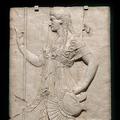033 Pronomina - alius, alter. Apis et homo
|another||bee||
033 Pronomen - noch eins, noch eins Die Biene und der Mann
033 Pronouns - another, another The bee and the man
033 Pronombres - otro, otro la abeja y el hombre
033 Pronoms - un autre, un autre L'abeille et l'homme
033 Pronomi: un altro, un altro L'ape e l'uomo
033 代名詞 - 別の者、他の者。蜂と人間
033 Voornaamwoorden - nog een, nog een De bij en de man
033 Pronomes - outro, outro A abelha e o homem
033 Займенники – інший, інший Бджола і людина
033 代词 - 另一个,另一个蜜蜂和人
Unius viri consilio, Themistoclis, anno ante Christum natum quadringentesimo octogesimo tota Graecia servata est.
||plan|Themistocles|in the year||Christ||four hundred|eighty-first|all||was saved|
||||||||四百八十|||||
|||||antes de Cristo||||||Toda Grecia||
All Greece was saved by the advice of one man, Themistocles, who was born four hundred and eighty in the year before Christ.
一人の男の計画、テミストクレスによって、紀元前480年に全ギリシャが守られました。
За порадою однієї людини, Фемістокла, в чотириста вісімдесятому році до нашої ери вся Греція була врятована.
Ante bellum Helvetiorum Caesar provinciae toti quam maximum militum numerum imperavit.
|||||to the whole of|||||ordered
||||州||||||
Before the war with the Helvetii, Caesar commanded the greatest number of soldiers in the whole province.
ヘルヴェティ氏族の戦争前に、カエサルは全省にできるだけ多くの兵士の数を命じました。
Перед війною з гельветами Цезар командував найбільшою кількістю солдатів у всій провінції.
Caesaris aetate Galliae totius factiones erant duae; harum alterius principes erant Aedui, alterius Arverni.
|||of all Gaul|||||one|leaders||the Aedui|of the other|Arverni tribe
||||||二つの|||||||
de César|en la época|de la Galia|||eran|dos|||líderes||||Arvernos
In the age of Caesar there were two factions in the whole of Gaul; the leaders of one of these were the Aedui, of the other Arverni.
カエサルの時代、ガリア全土には二つの派閥があった。そのうちの一つの指導者はエドゥイ族、もう一つはアルウェルニ族であった。
Noxii ambo alter alterum accusant.
the guilty||one|the other|accuse
被告人||||
Both accuse each other of harm.
二人は互いに互いを告発している。
Cui fortuna alterius nimis placet, sua saepe displicet.
|||||||displeases
|||||||不満を持つ
He who likes another's fortune too much, often dislikes his own.
他者の運があまりにも好まれる人は、しばしば自分の運が好まれない。
Populus Romanus viciis non ad alterius praeceptum, sed ad suum arbitrium imperabat.
||vices|||another's|precept of another||||own discretion|commanded
||||||||||判断|命令していた
The Roman people ruled by vice, not at the command of another, but at their own discretion.
ローマ人は他人の指示によるのではなく、自分の判断で支配していた。
Alii aliud placet.
others||
Others like something else.
人々はそれぞれ別のことが好きだ。
Homines alius alium adiuvare debet.
|another|another|help each other|
|||助け合う|
People should help each other.
人は互いに助け合わなければならない。
Parentibus nihil aliud maiori curae est quam salus liberorum.
|||greater|concern|||safety|
|||大きな|||||
There is nothing more important to parents than the safety of their children.
親にとって、子供の安全以上に大切なことは何もない。
Non sibi soli homo natus est sed etiam alteris.
||for himself||||||others
||||||||他者に
Man was born not only for himself, but also for others.
人は自分だけのために生まれたのではなく、他の人のためでもある。
"Apis et homo"
"The Bee and the Man"
「蜂と人間」
Est tibi ulla inter bestias amicior quam ego?
|||||friendlier||
||any||獣たち|||
||||||más que yo|
Is there any animal more friendly to you than I?
あなたにとって、獣の中で私ほど親しい者はいますか?
apis hominem interrogat.
||尋ねる
La abeja||
the bee asks the man.
蜂が人間に尋ねる。
Est, hic adfirmat.
||he affirms
||ここに主張する
It is, he affirms here.
はい、ここで主張しています。
Et quis?
And who?
¿Y quien?
そして誰?
Ovis.
ove
The sheep.
羊。
Lana enim eius mihi necessaria est, mel tuum gratum.
Lana is||||||||pleasing
ラナ||||||||
For its wool is necessary for me, your honey is pleasing.
彼女の毛は私にとって必要であり、あなたの蜜は感謝される。
Et ovis lanam suam mihi sine negotio dat; at ubi tu mihi mel tuum donas, aculeus tuus mihi periculum parat.
||wool||||trouble||||||||you give|sting|||danger|
|||||||||||||||針||||
And the sheep gives me its wool without any trouble; but when you give me your honey, your sting prepares danger for me.
羊は私に面倒なく自分の毛を与えてくれる。しかし、あなたが私にあなたの蜜を贈るとき、あなたの針は私に危険をもたらす。

